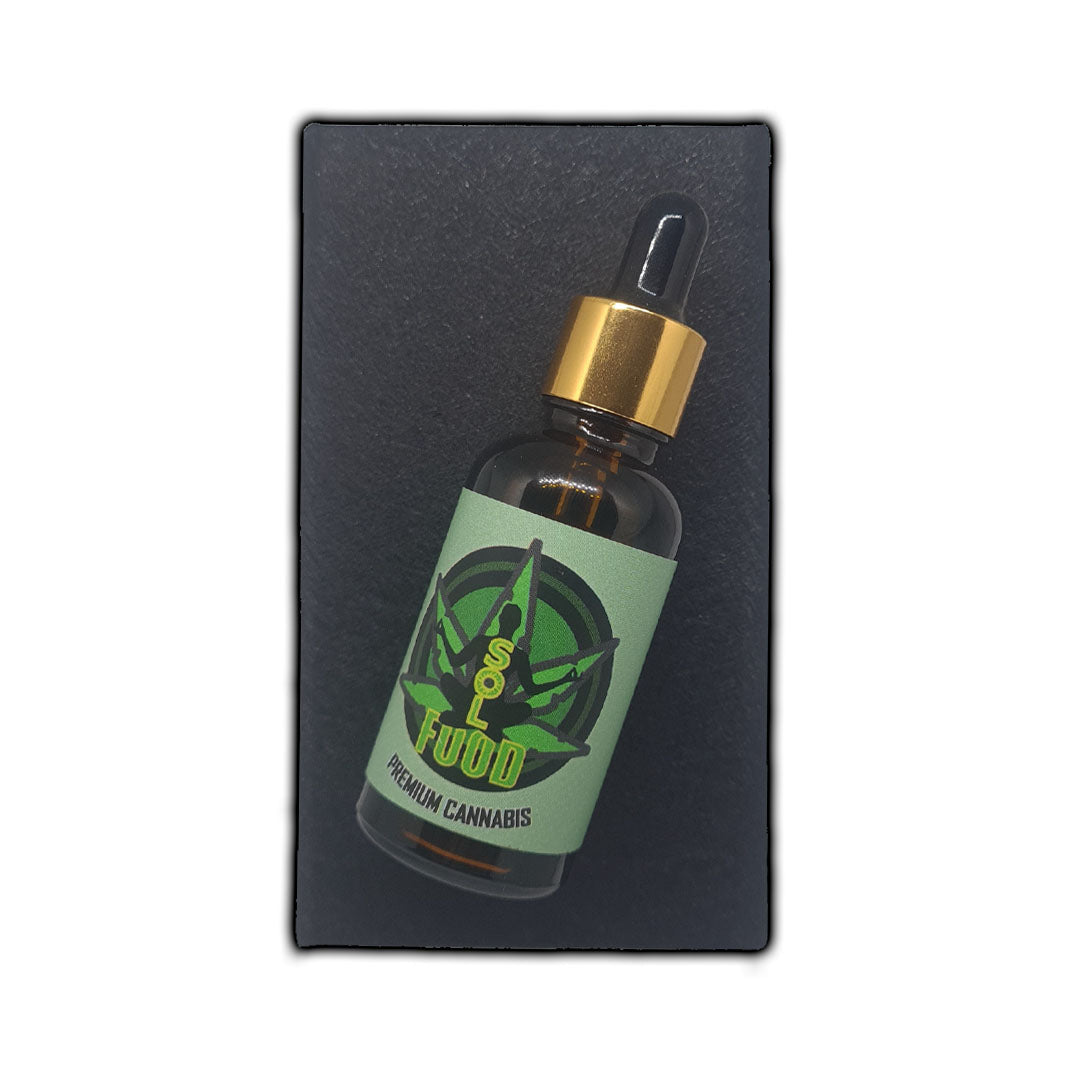CBD Oil 2,500 MG - 30 ML
Couldn't load pickup availability
CBD OIL DESCRIPTION |
Cannabidiol or CBD is a chemical compound found in the Cannabis Sativa plant. When applied topically or consumed through smoke inhalation or edible consumption, CBD interacts with neuroreceptors in your endocannabinoid system which sends signals between your cells to help regulate your movement, mood, homeostasis & immune system. CBD is often extracted from the cannabis sativa plant in oil form & mixed with an inert carrier oil like hemp seed oil for consumption. In fact of the 60 % of U.S adults who report having used CBD before, 55% of them use CBD oils & tinctures specifically according to a recent Forbes Health survey of 2,000 U.S adults conducted by OnePoll. CBD research is growing too. Here are nine ways studies suggest CBD oil could benefit your health. |
1. Offset Anxiety & Depression |
|
CBD’s ability to calm is perhaps its most popular effect & the reason its use is so widespread. A 2017 study in the Brazilian Journal of Psychiatry tested the anxiety levels of 57 men in a simulated public speaking test. Some received a placebo while others received either 150 milligrams, 300 milligrams or 600 milligrams of CBD before their speeches. Those who received 300 milligrams of CBD experienced significantly reduced anxiety during the test compared to those who received the placebo. Interestingly participants who received either 150 or 600 milligrams of CBD experienced more anxiety during the test than the 300 milligrams group. Meanwhile at least one study in mice revealed CBD had effects similar to the antidepressant imipramine. Human trials are needed though to confirm whether CBD can induce this same antidepressant reaction in our bodies. |
2. Treat Select Epilepsy Syndromes |
|
In some instances CBD can be used to treat epileptic seizures. In 2018 the Food & Drug Administration (FDA) approved the use of CBD under the brand name Epidiolex to treat seizures resulting from Lennox-Gastaut syndrome & Dravet syndrome two rare forms of epilepsy in patients at least 2 years old. Three well-vetted studies provide the basis of support for the FDA’s decision. In these trials, 516 patients with Lennox-Gastaut syndrome or Dravet syndrome received either Epidiolex or a placebo. Epidiolex when taken along with other prescribed medications, decreased the frequency of participants seizures compared to the placebo. |
3. Reduce PTSD Symptoms |
|
In a small 2018 study in the Journal of Alternative & Complementary Medicine, 11 people with post traumatic stress disorder (PTSD) received CBD along with routine psychiatric care for eight weeks in an outpatient psychiatric clinic. Ten of the 11 experienced a decrease in their PTSD symptoms. CBD was generally well tolerated, the researchers write. Margaret Rajnic, a doctor of nursing practice experienced in medical cannabis & CBD, emphasizes the importance of using therapy in tandem with any type of cannabis or CBD for PTSD. “There is an amount of therapy that is needed for PTSD,” she says. “But CBD will give you that little bit of decreased anxiety.” Four other human trials from 2012 to 2016 suggest CBD reduces PTSD symptoms although some include THC, or tetrahydrocannabinol, the main mind-altering element in cannabis. When THC & CBD work together they create what’s called an “entourage effect” complementing each other’s benefits & potency. For example, taking the same dose of THC & CBD together tempers the “high” from THC, while just a little THC paired with more CBD enhances the effects of the CBD. |
4. Treat Opioid Addiction |
|
Some studies both preclinical animal & human clinical trials suggest CBD could be used to help treat people who are dependent on opioids. In one such study researchers administered CBD to people with heroin use disorder. Over the course of a week, CBD significantly reduced heroin users cue-induced cravings, withdrawal anxiety, resting heart rate & salivary cortisol levels. No serious adverse effects were found. Other studies find CBD helpful in reducing various psychiatric & medical symptoms like anxiety, insomnia & pain in patients with substance use disorders indicating that CBD may be an effective treatment for opioid addiction. However, further studies are necessary. |
5. Alleviate ALS Symptoms |
|
Amyotrophic lateral sclerosis (ALS) is a disease that causes nerve cells in the brain & spinal cord to deteriorate resulting in loss of muscle control that worsens over time. It’s not yet understood exactly why ALS occurs, although it can be hereditary in some cases. There’s no known cure & there are only two FDA-approved medications to help treat ALS symptoms. Research suggests people with ALS can benefit from the entourage effect created by the combination of THC & CBD, similar to people with PTSD. In a 2019 study patients received a combination of THC & CBD in varying doses depending on their needs & preferences. Those with mild moderate or severe spasticity (muscle tightness & stiffness) due to ALS reported high levels of satisfaction with the treatment & those with moderate to severe spasticity reported higher satisfaction rates than those with mild spasticity. |
6. Relieve Unmanageable Pain |
|
In 2005, Canada approved the use of Sativex, an oromucosal (absorbed in the lining of the mouth) spray with equal proportions of THC & CBD for the treatment of multiple sclerosis related central neuropathic pain. In 2007, Canada approved the medicine’s use again for cancer pain that proved unresponsive to other medications. Meanwhile continued studies in the U.S indicate CBD is effective in treating chronic, non-cancer pain. In one 2020 study, researchers administered CBD topically to a group of patients with symptomatic peripheral neuropathy (a result of brain nerve & spinal cord nerve damage) while another group with the same condition received a placebo. Results showed a significant reduction in intense, sharp pains & cold, itchy sensations in those who used the topical CBD compared to those who used the placebo. No participants reported adverse side effects. When introduced topically, CBD oil doesn’t affect the systemic issue as it might if it were introduced directly into the bloodstream. Instead topical CBD is more localized & treats pain in a certain area. Since it’s more direct it may have a more pronounced effect. |
7. Ease Diabetic Complications |
|
For starters tests on human cells found that CBD helps reduce the effects of high glucose levels on other cells in the body which typically precedes the development of diabetes & various complications. Researchers concluded that with further studies, CBD could have significant benefits when used in patients with diabetes, diabetic complications & plaque build up in artery walls. In another small study 13 patients with type 2 diabetes who weren’t on insulin treatment were given both CBD & a placebo (in lieu of insulin). Researchers found CBD decreased their levels of resisting (which causes resistance to insulin, the protein that regulates sugar levels) & increased their levels of glucose-dependent insulinotropic peptide (a hormone that ensures a sufficient release of insulin from digested food) compared to their baselines before they started the test. These results suggest CBD could be a natural treatment for diabetes by helping the body regulate insulin-related hormone levels. |
8. Protect Against Neurological Disease |
|
Preclinical & clinical studies show that CBD has antioxidant & anti-inflammatory properties. Researchers deduce these characteristics can provide significant neuroprotection or protection against numerous pathological disorders. Several preclinical studies suggest CBD can produce beneficial effects against Parkinson’s disease, Alzheimer’s disease & multiple sclerosis. Huntington’s disease & cerebral ischemia were also tested, although significant positive results were not recorded. Further clinical studies are needed to confirm CBD’s benefits when used as a treatment for these disorders. |
9. Inhibit Arthritis Symptoms |
|
Arthritis involves the deterioration of the tissues in & around your joints. There are several types of arthritis & symptoms include pain, stiffness & loss of motion. Arthritis treatment usually targets pain relief & improved joint function. A 2006 study found that Sativex a CBD-based botanical drug approved in the United Kingdom in 2010 promoted statistically significant improvements in quality of sleep, pain during movement & pain at rest in patients with rheumatoid arthritis when compared to a placebo. It was the first controlled trial of Sativex as a treatment for rheumatoid arthritis involving 58 patients. CBD was found to have a pain-relieving effect as well as an ability to suppress disease activity. In 2018, in a study of more localized treatment researchers administered a synthetic CBD gel in either 250-milligram or 500-milligram doses daily or a placebo to patients with knee pain due to osteoarthritis. Patients also stopped taking any other anti-inflammatory medications or painkillers, with the exception of acetaminophen before & during the study period. The results were interesting, although not entirely conclusive. On one hand those treated with CBD did not experience much change in pain when compared with placebo patients. On the other hand, there were statistically significant differences between the group receiving the 250-milligram dose & the placebo group when measuring the average weekly improvement of their worst pain levels & their WOMAC (Western Ontario & McMaster Universities Arthritis Index) physical function rating. Additionally, men seemed to benefit from CBD more significantly than women in this test. |
Read more about CBD Oil.
Share





